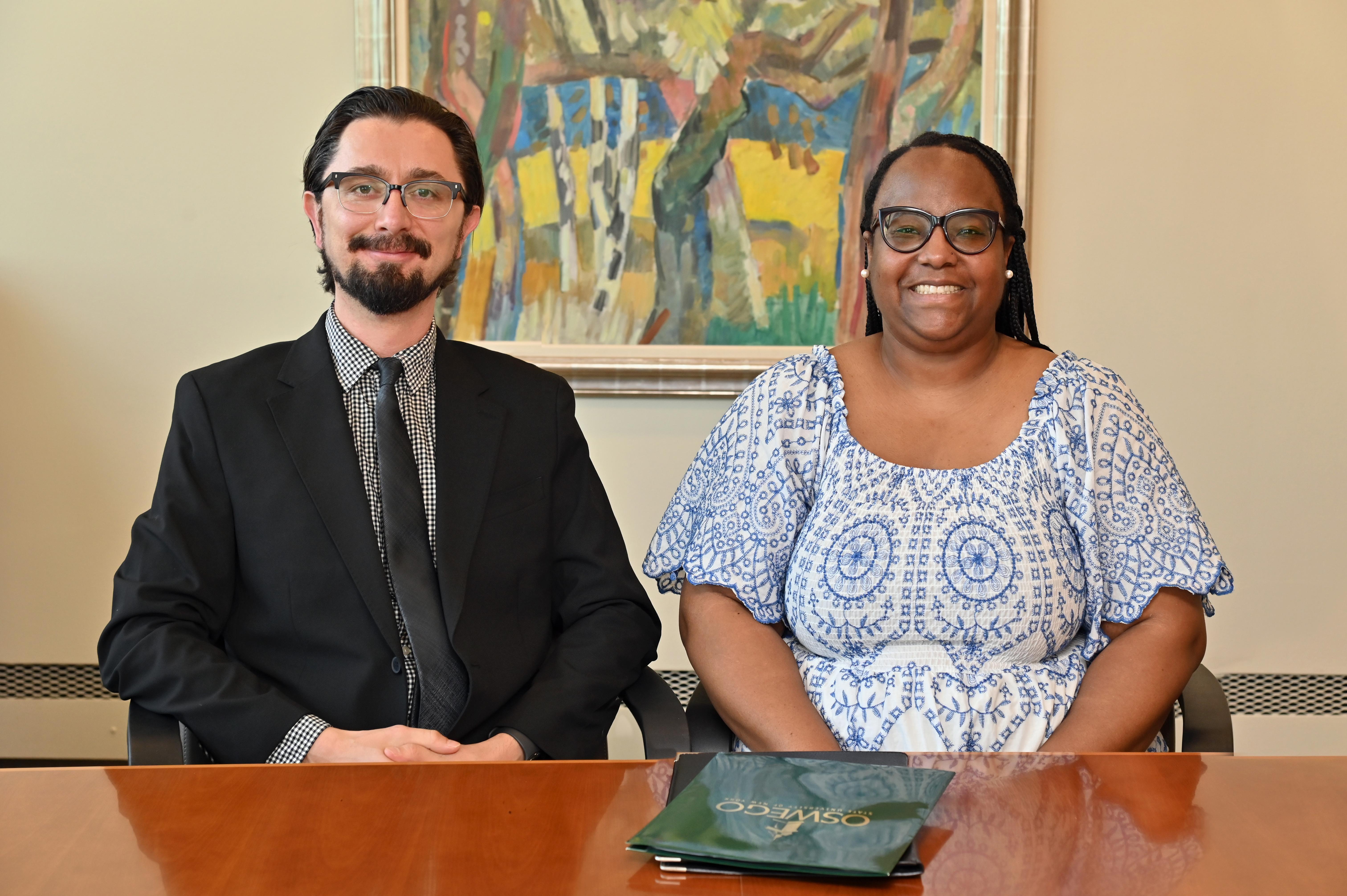Murat Yaşar and Nichole Brown are both members of the American Association of State Colleges and Universities' newest Emerging Leaders Program cohort.
SUNY Oswego’s Nichole Brown and Murat Yaşar were among the 37 talented academic and administrative professionals selected by the American Association of State Colleges and Universities (AASCU) for its 2025-26 Emerging Leaders Program (ELP).
For Oswego’s College of Education, Health and Human Services, Brown serves as director of both the Clinical Practice and Partnerships Office and Teacher Opportunity Corps (TOC II) program. Yasar heads up several key initiatives as deputy to the president for strategy, planning and special projects.
This year’s cohort is the largest in the program’s 10-year history. For a comprehensive university to have two representatives is unusual but reflects well upon the participants and the institution.
Saying she was “deeply honored” to be part of the program, Brown noted: “This opportunity represents a meaningful step in my leadership journey and reflects SUNY Oswego’s shared commitment to equity, student success and transformational impact.”
“It’s a meaningful opportunity to grow as a leader, reflect more deeply on the challenges and opportunities in higher education, and sharpen the skills needed to lead with vision and impact,” Yaşar said.
“This experience will not only strengthen my own leadership practice but also enhance the work we’re doing at SUNY Oswego, particularly as we implement our new strategic plan and advance student success and institutional transformation,” he added. “Being part of a national network of higher education leaders allows me to bring new perspectives and best practices back to our campus community.”
Brown appreciates the opportunities to connect and collaborate with talented peers who share a passion for helping shape the future of the higher education landscape while also learning how to lead the way in achieving their goals.
“This program offers space to reflect, grow and refine the kind of leaders I am and aspire to be: one who leads with integrity, courage and a vision for systems change,” Brown said. “This work will reflect my own leadership development and make a meaningful contribution to the broader efforts to foster belonging, opportunity and excellence at SUNY Oswego.”
“I’m especially looking forward to engaging with colleagues from across the country who are equally committed to the role of regional public universities in the US in terms of social mobility and student success,” Yaşar said.
Advancing personal, professional, institutional goals
In addition to building skills and a network, the program asks participants to develop an initiative on their campus that advances personal, professional and institutional goal.
“The opportunity to work on a campus-based leadership project with the support of mentors and peers is incredibly valuable,” Yaşar noted. “I’m eager to apply what I learn to help drive meaningful change at SUNY Oswego — whether that’s enhancing cross-campus collaboration, aligning strategy with action, or better supporting our students.”
Brown’s project will integrate SUNY Oswego’s Vision 4040 with what’s known as the University-Assisted Schools model in establishing STEM-focused hubs in underserved Central New York school districts. This work also connects with a Micron Technology grant allowing the university to establish the Oswego Regional Center for STEM Excellence.
“By combining academic enrichment, workforce development and community engagement, the initiative aims to increase enrollment, strengthen STEM and teaching pathways, and promote regional economic growth,” Brown said.
Her project also aligns with My Brother’s Keeper, a program that focuses on “recruitment, retention and mentorship and holistic support of Black and Brown male students, particularly those pursuing educator partnership pathways,” Brown explained. “The program seeks to transform institutional practices, expand regional partnerships and serve as a scalable model for equity-driven educational infrastructure.”
Yaşar’s project relates to a key institution-wide emphasis of infusing strategic planning and goals into everyday activities and actions.
“My project for this program is related to my current position: to successfully begin the implementation phase of our new strategic plan, Transforming Lives, Igniting Possibilities, in its first year,” Yaşar said. “I would like to continue to promote the strategic plan to our campus community and help them translate strategies into tangible actions.”
About the program
ELP has helped talented higher education professionals gain the critical skill set and mindset needed to advance to higher-level administrative positions in academe. ELP combines robust in-person and virtual programming that cultivates a comprehensive understanding of important issues, including effective communication, project management, navigating and leading change, and defining a leadership philosophy.
The intensive, in-person component of ELP started in Washington, D.C. in late June. Throughout the year, participants will participate in interactive online sessions. In addition, cohort members will lead a project or initiative at their home campuses under the guidance of a mentor and with support from a project advisor from the AASCU community.
ELP also encourages deep peer-to-peer learning. Participants are provided formal and informal ways to build intentional connections with each other, as well as with their advisors, mentors, ELP faculty, and the AASCU community at large.
“The AASCU Emerging Leaders Program is more than a leadership development opportunity. It’s an investment in the future of higher education. We are proud to support our emerging leaders as they grow their skills, expand their networks, and prepare to shape the future of student success and institutional excellence,” said Kristin G. Esterberg, chancellor of the University of Washington Bothell and ELP executive sponsor.
The American Association of State Colleges and Universities (AASCU) is a Washington, D.C.-based higher education association that represents the sector of over 500 regional public colleges, universities, and systems whose members share a learning- and teaching-centered culture, a historic commitment to underrepresented student populations, and a dedication to research and creativity that advances their regions’ economic progress and cultural development. These are institutions delivering America’s promise.




